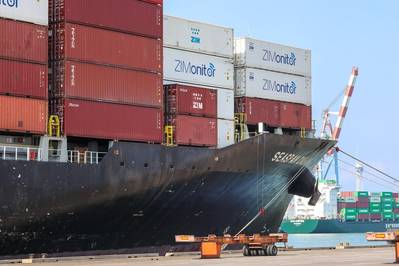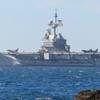Israel's Ship Industry Urges Government to Help with Jump in War Insurance
Ships sailing for Israel face a 10-fold jump in war risk premiums as the conflict in Gaza intensifies, prompting industry calls for the government to help ensure vital imports keep coming.
Israel has vowed to annihilate Islamist group Hamas after its fighters stormed through Israeli towns from Gaza on Oct. 7, killing 1,400 people and seizing more than 220 hostages.
Israeli forces have hit back with deadly air strikes and now a ground offensive on the narrow coastal strip, with growing fears the conflict could escalate and pull in the whole region.
Israel, which relies on seaborne trade for its economy, said last week it would provide compensation for ships damaged due to the war. But industry officials worry that may not be enough.
Israeli waters are considered a high risk zone by marine insurers and every ship is required to pay an additional war risk premium, which is typically renewed every seven days.
Such premiums have soared ten-fold in recent weeks, adding tens of thousands of dollars to every voyage, industry sources say. And this means higher freight costs.
Shipping groups Zim and HMM have said they will pass on a war risk surcharge to customers on shipments to Israel.
"We need those ships to come. We understand that there is a reason for the risk," said Ron Malcha, executive chairman of Haifa Port, told Reuters. The ports ... are the oxygen for the Israeli economy".
"This is exactly the time for the government to step in and to see that they share the risk with the private sector, which makes it more bearable."
The finance ministry said subsidising the cost of additional war risk premiums was not being considered as of now, adding it was examining "additional solutions that will provide an insurance defense for vessel owners", without giving details.
Uzi Itzhaki, chair of the board of directors at state-owned Israel Port Company, which is responsible for the maintenance and development of Haifa, Ashdod and Eilat ports, was confident the government would take whatever steps were needed to preserve trade, including covering the risk premiums.
"In order to safeguard Israel's critical needs in a scenario that is a bit more serious, decisions will be made accordingly. I am sure of it," he said.
Shlomi Fogel, another leading player in Israel's maritime industry and co-owner of Israel Shipyards ISHI.TA, which operates a small port in Haifa bay, said for now the receivers of cargo ended up paying the extra costs.
"We are trying to push very hard. The government is trying to help on this issue," he said.
Over 8,000 rockets have been fired from Gaza since Oct. 7, according to Israeli government data, although Israel's ports have not been hit.
While Ashkelon port, which is closest to Gaza, has closed, other terminals remain fully functioning and both Ashdod in the south and Haifa in the north are also protected by Iron Dome air defence batteries.
Nevertheless, concerns are growing about the safety of Israeli waters.
The Marshall Islands registry, one of the world's top shipping flags, on Tuesday raised its security level for Israeli waters to its highest, which industry sources said was likely to deter port calls.
"The threat of collateral damage to merchant vessels has increased significantly," the registry said in an advisory.
Changing course
One crude oil tanker that was bound for Ashkelon diverted to Haifa in recent days and another went to Israel's most southern port of Eilat, according to data and analytics group Kpler.
The vessels switched their AIS tracking transponders off given concerns about Israeli waters, Kpler data showed.
Israel Shipyards' Fogel, who is also a partner in the port of Eilat, said the state operates a strategic pipeline from Eilat to Ashkelon, which could enable supplies for refineries.
He added that while Haifa port was easier, given closer proximity to the country's refineries, Eilat was more secure.
"So definitely, we will use all our capabilities."
(Reuters - Editing by James Mackenzie and Mark Potter)











